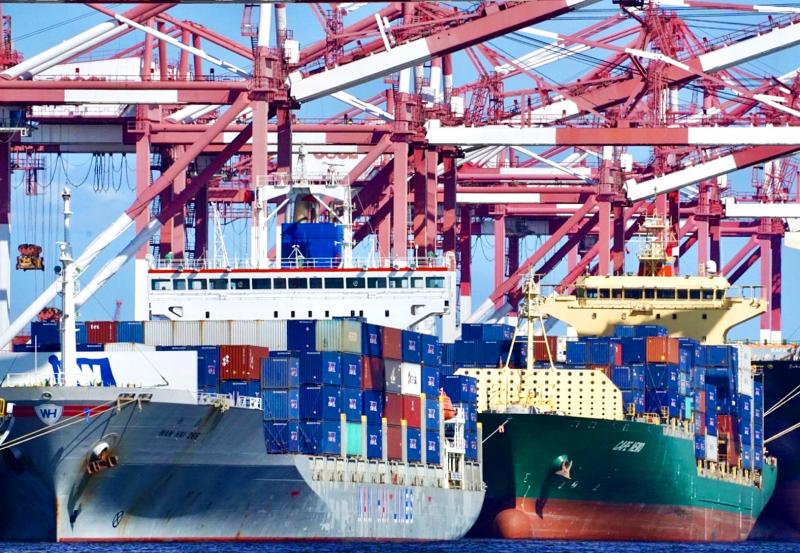Exports last month surged 30.2 percent year-on-year to a record US$41.58 billion, as a global recovery propped up demand in almost all product categories and selling prices increased, the Ministry of Finance said yesterday.
Outbound shipments might again top US$40 billion this month, making the current quarter the strongest in history as the COVID-19 pandemic and digital transformation reshape consumer behavior and product supply chains, Department of Statistics Director-General Beatrice Tsai (蔡美娜) told a news conference in Taipei.
Last month’s “export data are surprisingly impressive and would remain strong this month,” Tsai said, adding that exporters hiked selling prices to reflect rising raw material costs.

Photo: CNA
The unprecedented showing also had to do with holiday demand and delayed shipments from previous months, Tsai said.
Electronics shipments grew 26.6 percent to US$15.93 billion, while exports of information and communications technology products gained 19.5 percent to US$5.69 billion, the ministry’s monthly report said.
Several electronics suppliers have said that they have more orders than they can digest due to component shortages and chaos in the shipping sector.
Exports picked up across the world as rising COVID-19 vaccination rates gave countries confidence to lift lockdowns.
That explained why shipments to Europe swelled 56 percent and inflated 39.2 percent to the US, the report said.
Exports to ASEAN markets jumped 31.2 percent and rose 29.1 percent to Japan, it said.
China also increased purchases of Taiwanese goods by 18.9 percent year-on-year, it said.
However, shipments of optical devices dropped 3 percent, although domestic flat-panel providers said that seasonal price corrections would soon end.
Exports of non-tech products advanced 20 to 164.6 percent, as price hikes benefited mineral products the most, the report said.
Formosa Plastics Group (台塑集團), Taiwan’s largest industrial conglomerate, this week said that sales would weaken in the next three months, with the Lunar New Year to cut working hours and uncertainty escalating due to the quickly spreading Omicron variant of SARS-CoV-2.
Imports spiked 33.8 percent to US$35.86 billion, the second-highest in history, driven by aggressive demand from local semiconductor companies to upgrade and expand capacity with equipment abroad, Tsai said.
Imports of semiconductor capital equipment soared 36.1 percent to US$2.7 billion, offsetting a steep retreat in imports of vehicles and smartphones, the report said.
Taiwan last month had a trade surplus of US$5.71 billion, an 11.1 percent increase from a year earlier.
For the first 11 months of this year, exports expanded 30 percent to US$93.61 billion, while imports grew 33.8 percent to US$87.37 billion, the ministry said.

Intel Corp chief executive officer Lip-Bu Tan (陳立武) is expected to meet with Taiwanese suppliers next month in conjunction with the opening of the Computex Taipei trade show, supply chain sources said on Monday. The visit, the first for Tan to Taiwan since assuming his new post last month, would be aimed at enhancing Intel’s ties with suppliers in Taiwan as he attempts to help turn around the struggling US chipmaker, the sources said. Tan is to hold a banquet to celebrate Intel’s 40-year presence in Taiwan before Computex opens on May 20 and invite dozens of Taiwanese suppliers to exchange views

Application-specific integrated circuit designer Faraday Technology Corp (智原) yesterday said that although revenue this quarter would decline 30 percent from last quarter, it retained its full-year forecast of revenue growth of 100 percent. The company attributed the quarterly drop to a slowdown in customers’ production of chips using Faraday’s advanced packaging technology. The company is still confident about its revenue growth this year, given its strong “design-win” — or the projects it won to help customers design their chips, Faraday president Steve Wang (王國雍) told an online earnings conference. “The design-win this year is better than we expected. We believe we will win

Chizuko Kimura has become the first female sushi chef in the world to win a Michelin star, fulfilling a promise she made to her dying husband to continue his legacy. The 54-year-old Japanese chef regained the Michelin star her late husband, Shunei Kimura, won three years ago for their Sushi Shunei restaurant in Paris. For Shunei Kimura, the star was a dream come true. However, the joy was short-lived. He died from cancer just three months later in June 2022. He was 65. The following year, the restaurant in the heart of Montmartre lost its star rating. Chizuko Kimura insisted that the new star is still down

While China’s leaders use their economic and political might to fight US President Donald Trump’s trade war “to the end,” its army of social media soldiers are embarking on a more humorous campaign online. Trump’s tariff blitz has seen Washington and Beijing impose eye-watering duties on imports from the other, fanning a standoff between the economic superpowers that has sparked global recession fears and sent markets into a tailspin. Trump says his policy is a response to years of being “ripped off” by other countries and aims to bring manufacturing to the US, forcing companies to employ US workers. However, China’s online warriors